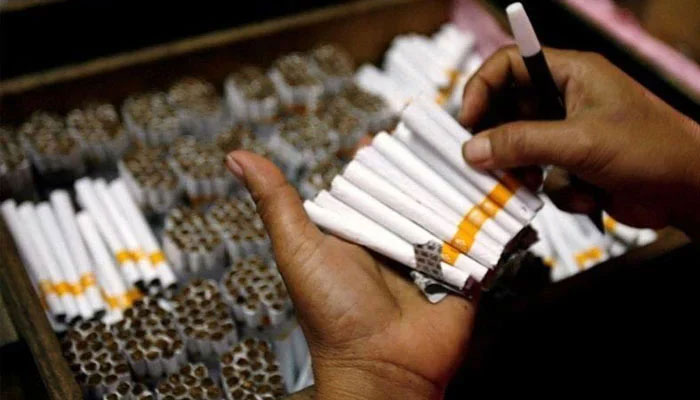In smoke and shadows
Over 50% of Pakistan’s cigarette market is controlled by illegal manufacturers who evade taxes
Pakistan is grappling with a critical issue – a rampant illicit cigarette trade, dominated by non-taxpaying local manufacturers. This underground market not only drains vital tax revenue but also undermines the formal tobacco industry, distorts economic growth, and weakens public health initiatives.
Despite its widespread impact, the government has largely remained silent, raising concerns about the influence of powerful lobbies and political agendas.
Over 50 per cent of Pakistan’s cigarette market is controlled by illegal manufacturers who evade taxes. These untaxed cigarettes flood the market, often at a fraction of the cost of legal products, depriving the government of crucial revenue. This lost revenue could fund social programmes, improve infrastructure, and support public health initiatives aimed at reducing tobacco use.
The continued growth of this illegal sector raises a troubling question: Is the government more concerned with protecting powerful vested interests than with safeguarding public health and economic stability?
Complicating matters are NGOs that advocate for tobacco control but have been linked to allegations of embezzlement, financial mismanagement, and potential diversion of funds for terror financing. Over the past years, there have been numerous terminations within these organisations due to embezzlement and financial mismanagement.
In a country like Pakistan, where health funding is already scarce, these misappropriations further hinder efforts to combat smoking. Adding to the problem, some INGOs downplay the issue of illicit trade in the tobacco sector, unintentionally providing cover for illegal manufacturers. In their pursuit of funding, these organisations often compromise their ethical standards, which not only undermines tobacco control efforts but also exacerbates broader public health and economic challenges.
Despite claims of prioritising economic growth, the ongoing illicit cigarette trade suggests that entrenched lobbies continue to undermine regulatory enforcement, particularly in the tobacco sector. This highlights a deeper issue – powerful interests within the illicit trade influence policy, preventing the government from taking decisive action.
The unchecked growth of the illicit cigarette market not only results in lost tax revenue but also threatens Pakistan’s broader business environment. Legitimate businesses are forced to compete with illegal products that evade taxes and are often produced under substandard conditions. This creates an uneven playing field, discouraging investment and sending a negative signal to foreign investors. If left unchecked, the illicit trade risks damaging investor confidence, stunting economic growth, and pushing away much-needed foreign capital.
Pakistan must confront the realities of its illicit cigarette trade by enforcing stricter laws and regulations. This issue is not just about protecting businesses or generating revenue – it is about ensuring a level playing field, securing economic stability, and protecting public health. Addressing this silent crisis can help reclaim lost tax revenue, support legitimate industries, and reduce the harm caused by tobacco consumption.
The question remains: Will the Pakistani government stand up to powerful lobbies and take action, or will it continue to allow the illicit trade to undermine the country’s economy, public health and rule of law? The time for action is now.
The writer is the CEO of an advocacy firm dedicated to curbing illicit trade and tax evasion in Pakistan.
-
 Milo Ventimiglia Calls Fatherhood 'pretty Wild Experience' As He Expects Second Baby With Wife Jarah Mariano
Milo Ventimiglia Calls Fatherhood 'pretty Wild Experience' As He Expects Second Baby With Wife Jarah Mariano -
 Chinese Scientists Unveil Advanced AI Model To Support Deep-space Exploration
Chinese Scientists Unveil Advanced AI Model To Support Deep-space Exploration -
 Anthropic’s New AI Tool Wipes Billions Off Cybersecurity Stocks
Anthropic’s New AI Tool Wipes Billions Off Cybersecurity Stocks -
 Trump Announces He Is Sending A Hospital Ship To Greenland Amid Rising Diplomatic Tensions
Trump Announces He Is Sending A Hospital Ship To Greenland Amid Rising Diplomatic Tensions -
 'Never Have I Ever' Star Maitreyi Ramakrishnan Lifts The Lid On How She Avoids Drama At Coffee Shops Due To Her Name
'Never Have I Ever' Star Maitreyi Ramakrishnan Lifts The Lid On How She Avoids Drama At Coffee Shops Due To Her Name -
 Inside Prince William’s Plans For Prince Harry: What Will Happen To Duke Once He’s King
Inside Prince William’s Plans For Prince Harry: What Will Happen To Duke Once He’s King -
 Chyler Leigh Pays Moving Homage To 'Grey’s Anatomy' Co-star Eric Dane: 'He Was Amazing'
Chyler Leigh Pays Moving Homage To 'Grey’s Anatomy' Co-star Eric Dane: 'He Was Amazing' -
 Did You Know Tech CEOs Limit Screen Time For Their Own Kids?
Did You Know Tech CEOs Limit Screen Time For Their Own Kids? -
 Matthew Lillard Admits Fashion Trends Are Not His 'forte'
Matthew Lillard Admits Fashion Trends Are Not His 'forte' -
 SpaceX Launches Another Batch Of Satellites From Cape Canaveral During Late-night Mission On Saturday
SpaceX Launches Another Batch Of Satellites From Cape Canaveral During Late-night Mission On Saturday -
 Princess Beatrice, Eugenie Get Pulled Into Parents’ Epstein Row: ‘At Least Stop Clinging!’
Princess Beatrice, Eugenie Get Pulled Into Parents’ Epstein Row: ‘At Least Stop Clinging!’ -
 Inside Kim Kardashian's Brain Aneurysm Diagnosis
Inside Kim Kardashian's Brain Aneurysm Diagnosis -
 Farmers Turn Down Millions As AI Data Centres Target Rural Land
Farmers Turn Down Millions As AI Data Centres Target Rural Land -
 Trump Announces A Rise In Global Tariffs To 15% In Response To Court Ruling, As Trade Tensions Intensify
Trump Announces A Rise In Global Tariffs To 15% In Response To Court Ruling, As Trade Tensions Intensify -
 Chappell Roan Explains Fame's Effect On Mental Health: 'I Might Quit'
Chappell Roan Explains Fame's Effect On Mental Health: 'I Might Quit' -
 AI Processes Medical Data Faster Than Human Teams, Research Finds
AI Processes Medical Data Faster Than Human Teams, Research Finds




